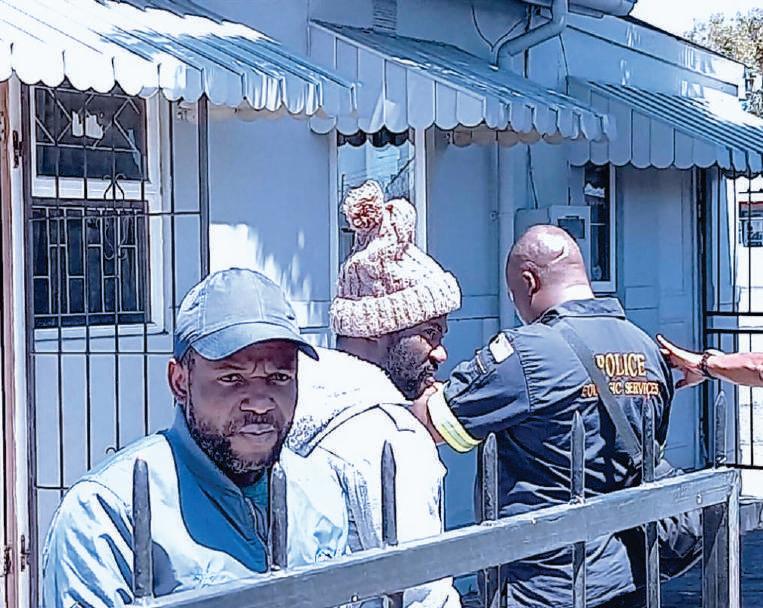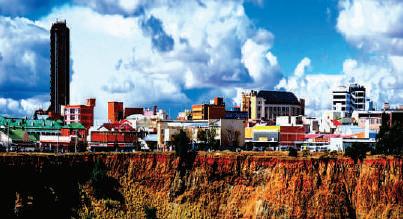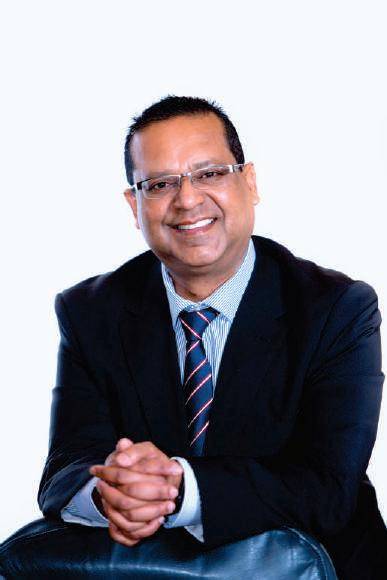
5 minute read
'It Was A Bit Bad': Why Sex Worker Left Home For Alleged Brothel
Plucked from the diamondhustling dorpie of Springbok in the Northern Cape, Emma* moved to the bright lights of Cape Town, fully aware that the job she was heading for would involve sex for cash.
She had lost her job at the local Spar and was at a loose end, caught up in bitter arguments with her alcoholic mother. She used the street drugs tik and mandrax as the days rolled into one another in a town with few chances of finding another job.
Advertisement
"It was a bit bad," she said. She went to live with Leandra WilliamsAyuk, one of the accused in a sex trafficking trial in the Western Cape High Court, to get a break from her mother When WilliamsAyuk allegedly offered her a job as a prostitute, as Emma describes the job, she decided to take her up on the offer and moved to "die Kaap", as she calls CapeTown.
From a house off Koeberg Road, which joins the freeways spiralling out of the CBD, she would start an evening's work by smoking two rocks of crack cocaine to give her the jump-start she needed to walk up the road, past theYsterplaatAir Force Base's imposing brick wall to her right.
At the end of Piet Grobler Street, she would cross over and stand at a corner near the brightly painted building that doubles as a clothing shop, and a doctor's consulting room, and wait for clients to pull up in their cars. Sometimes she didn't "feel lus" (wasn't interested), and to bump up her energy, she would go and get another rock, on credit.
On a good day, she would make R500; on a not-so-good day, R300 a night.
However, this money would go right back into the pockets of a man at the house who let her buy the R50 rocks on credit when she wasn't bringing in any customers. The money for the drugs came out of her takings at the end of the night.
In return, she got a roof over her head, a hearty plate of jollof rice "with just a little bit of chilli in it", and some underwear, some short dresses and some long dresses. Sometimes they would get R40 or R50 to go and buy their own food.
TheAyuks would buy her Shield deodorant, some "women's things" and her "period things".
Emma is testifying as a Section 204 witness to help the court make sense of the allegations levelled at the three.
Crack cocaine and sex work are not legal in SouthAfrica, although SouthAfrica is hoping to decriminalise sex work with a proposed new bill.
WilliamsAyuk and theAyuk brothers have all pleaded not guilty in the human trafficking trial which is trying to tease out evidence to substantiate a long list of charges which range from kidnapping to debt bondage to assault, drugs and rape.They say they are being set up because they complained about a policeman who works out of the Milnerton police station up the road.
Some of the girls and women who testified have said they ended up being trapped, working for drugs, never having money of their own, never being able to make personal calls and not being able to leave. One said a relative pretended to be a customer to get her out.
Like Emma, they came with histories of being estranged from their family, and interrupted their formal education to make money out of their street smarts instead. Most were already drug users and sex workers. Some were barely out of their early teens.
One of the women who was a teenager when she was offered work at the house said she worked for herself to buy nice things because her family was very poor. Her method was to circulate her phone number among potential customers while partying at clubs.
Their services allegedly included entertaining customers who came for the business' other service - a room to get high in.
How safe is your neighbourhood? Find out by using News24's CrimeCheck

Testifying confidently in very fast Afrikaans, a rare smile crossed her face at the translation to Pidgin for the word alcoholgogoro - the onomatopoeia delighting her as she appeared to recognise it.The Pidgin is for the benefit of theAyuk brothers, who hail from a part of Cameroon caught up in a decades-long border dispute with Nigeria.
The house itself is unrecognisable now after a major renovation by the new landlord who rents out rooms, with a spaza shop that sells the largest selection of Spookies chips flavours on that side of the Black River
If JudgeAlma de Wet finds Emma's testimony credible and helpful, she will be declared immune from prosecution, given that she has opened up on her own drug use and sex work while testifying.
During the lunch break, Emma sits on the cool granite steps outside the court, curling her legs into her tiny body as she rests against a pillar, sunning herself, all alone.
The trial will continue on Monday with the cross examination of Emma by the defence.
- News24



For young people in the Northern Cape’s indigenous communities, tertiary education has long been an elusive dream. Now, their chances of accessing education and training have improved significantly, thanks to a R25 million donation towards the Sol Plaatje University’s (SPU) Lesedi LaAfrika Fund by AngloAmerican’s subsidiaries Kumba Iron Ore and De Beers Group.
The Lesedi LaAfrika Fund aims to raise R100 million in the next three years to support the university’s scholarships, infrastructure, social impact projects, and staff wellness programmes. Kumba Iron Ore has pledged R20 million towards the fund, and De Beers a further R5 million.
Qondakele Sompondo, Director for InstitutionalAdvancement at SPU, said the funding would make a significant impact on the lives of the youth of the Northern Cape.
“The plight of the youth in indigenous communities (Nama, San, Khoi, and Griqua) and in the Northern Cape is something that needs our urgent attention. Through the fund, we want to do something bigger than normal: we will award scholarships to augment what NSFAS is doing by funding the poorest of the poor,” he said.
Kumba Iron Ore’s Executive Head of CorporateAffairs, Pranill Ramchander, said the company’s donation was ‘an investment into the future of the Northern Cape’. “Education is one of the key pillars in Kumba’s Sustainable Mining Plan aimed to improve the lives of young people, not only in our host communities but across the Northern Cape province,” he said.

De Beers Group production manager Sonja van Rooyen said the company’s R5 million donation was part of is ongoing commitment to the province and its people.

“Through this endowment, we want to make a university education available to more youth of this province,” she said.
Speaking at a gala dinner hosted by SPU as part of its 10year celebrations, ViceChancellor and Principal ProfessorAndrew Crouch reflected on the significant progress the university has made in the nine years of its existence.
“Sol Plaatje University started humble, and built up to where it is today because of people wanting to bring change in the province and ultimately the country through the power of teaching and learning and producing graduates,” he said.
SPU has seen major growth in its enrolment figures and staff recruitment in recent years, with 60% of its academic staff having PhDs.
As part of its sustainable growth, the institution is committed to community engagement and scholarly activity. “The University should be embedded in the community and society and contribute towards producing knowledgeable graduates who plough back to their communities,” said Prof Crouch.SA Good News






